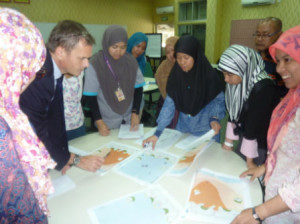Oiled wildlife preparedness workshop held in Aberdeen
 In October Sea Alarm and Oil Spill Response (OSRL) organised and facilitated an Oil and Gas UK (OGUK) sponsored daylong workshop on UK oiled wildlife preparedness.
In October Sea Alarm and Oil Spill Response (OSRL) organised and facilitated an Oil and Gas UK (OGUK) sponsored daylong workshop on UK oiled wildlife preparedness.
 In October Sea Alarm and Oil Spill Response (OSRL) organised and facilitated an Oil and Gas UK (OGUK) sponsored daylong workshop on UK oiled wildlife preparedness.
In October Sea Alarm and Oil Spill Response (OSRL) organised and facilitated an Oil and Gas UK (OGUK) sponsored daylong workshop on UK oiled wildlife preparedness.
 Oil Spill Response (OSRL) is offering its Oiled Wildlife Response Planning course, developed in collaboration with Sea Alarm and other international oiled wildlife professionals, twice in 2015. The course will be given in Singapore in February and again in November in Belgium.
Oil Spill Response (OSRL) is offering its Oiled Wildlife Response Planning course, developed in collaboration with Sea Alarm and other international oiled wildlife professionals, twice in 2015. The course will be given in Singapore in February and again in November in Belgium.
 In June, Hugo Nijkamp and Claude Velter provided Sea Alarm’s two-day Wildlife Response Planning Course to emergency response officers from Oil and Gas Operators in Brunei. This course looks at the various challenges that oil spills could pose to wild animals, and the various wildlife incident scenarios that could occur.
In June, Hugo Nijkamp and Claude Velter provided Sea Alarm’s two-day Wildlife Response Planning Course to emergency response officers from Oil and Gas Operators in Brunei. This course looks at the various challenges that oil spills could pose to wild animals, and the various wildlife incident scenarios that could occur.
 In May, Sea Alarm staff will travel to Savannah, USA for the International Oil Spill Conference (IOSC).
In May, Sea Alarm staff will travel to Savannah, USA for the International Oil Spill Conference (IOSC).
Sea Alarm has seen a growing recognition in 2011 by the oil industry of the need to take oiled wildlife response seriously and to devote it the same attention as traditional oil spill response.
 Sea Alarm was invited to present its views on European oiled wildlife preparedness and response at a national wildlife seminar in Norway. The seminar took place on 17 and 18th March in Oslo and was jointly organised by Friends of the Earth Norway and the Norwegian oil companies operating association (NOFO).
Sea Alarm was invited to present its views on European oiled wildlife preparedness and response at a national wildlife seminar in Norway. The seminar took place on 17 and 18th March in Oslo and was jointly organised by Friends of the Earth Norway and the Norwegian oil companies operating association (NOFO).
![]() Following an earlier discussion in 2009, Benoit Loicq from the European Community Shipowners Association (ECSA) visited the Sea Alarm offices in Brussels last September. The aim of this meeting was for both organisations to present their activities and look at areas of common interest. Mr Loicq explained the setup and programme of ECSA, which is an international association made up of the national shipowner associations in each EU Member State. ECSA works to promote and represent European shipping interests though specialised committees, including an Environment and Safety Committee.
Following an earlier discussion in 2009, Benoit Loicq from the European Community Shipowners Association (ECSA) visited the Sea Alarm offices in Brussels last September. The aim of this meeting was for both organisations to present their activities and look at areas of common interest. Mr Loicq explained the setup and programme of ECSA, which is an international association made up of the national shipowner associations in each EU Member State. ECSA works to promote and represent European shipping interests though specialised committees, including an Environment and Safety Committee.
 Sea Alarm’s Saskia Sessions made a presentation during a training course on oiled wildlife rehabilitation in Ankara, Turkey on 3-7 May. This training was for wildlife rehabilitators, scientists, veterinarians and environmental NGOs on techniques and key considerations for hands-on rehabilitation of oiled wildlife. The training course was hosted by BTC (Baku-Tbilisi-Ceyhan) pipeline company, as part of their ongoing efforts to improve preparedness for an oil spill from the pipeline.
Sea Alarm’s Saskia Sessions made a presentation during a training course on oiled wildlife rehabilitation in Ankara, Turkey on 3-7 May. This training was for wildlife rehabilitators, scientists, veterinarians and environmental NGOs on techniques and key considerations for hands-on rehabilitation of oiled wildlife. The training course was hosted by BTC (Baku-Tbilisi-Ceyhan) pipeline company, as part of their ongoing efforts to improve preparedness for an oil spill from the pipeline.
 Sea Alarm had a very productive and enjoyable week at the recent Interspill Conference and Exhibition in Marseille, France.
Sea Alarm had a very productive and enjoyable week at the recent Interspill Conference and Exhibition in Marseille, France.
Sea Alarm booth’s benefitted from an exceptional position in the exhibition hall, just next to the entrance door. This offered Sea Alarm’s staff an unparalleled opportunity to meet and consult with a large number of representatives from European governmental agencies and the oil spill industry. EMPOWER, Sea Alarm’s new initiative to professionalise the response of NGOs to marine wildlife emergencies, piqued the interest of many delegates, especially as EMPOWER was highlighted in the Interspill Catalogue.
 Oil Spill Response will work together with the Wildlife Rehabilitation Centre in Ostend to test the filtering system of the newly developed wildlife fastanks. Three fastanks, which run on one filter system, will be transported to Ostend, where they will be used for several months in the rehabilitation of oiled birds.
Oil Spill Response will work together with the Wildlife Rehabilitation Centre in Ostend to test the filtering system of the newly developed wildlife fastanks. Three fastanks, which run on one filter system, will be transported to Ostend, where they will be used for several months in the rehabilitation of oiled birds.